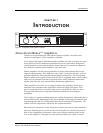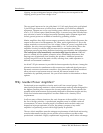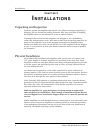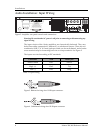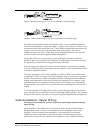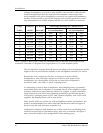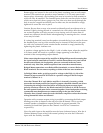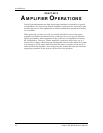
Introduction
4 Matica 500/900 Reference Manual
clipping, not just a designated output voltage which may not correspond to the
clipping point if power line voltage is low.
The rear panel inputs can be via gold plated 1/4" (6.3 mm) phone jacks, gold plated
3 pin XLR-type connectors or barrier screw terminals, all of which are standard
equipment. Outputs are on five-way binding posts which can accept large diameter
wire or 3/4" (19 mm) spaced dual banana plugs. A recessed rear panel switch allows
easy selection of stereo or bridged monaural operating modes. Separate signal and
chassis ground points are available to handle any grounding scheme.
Matica amplifiers have high current output protection relays which disconnect the
output in the event of overtemperature, DC offset, audio signals below 5 Hz on the
output terminals or excessively low line voltage. When AC power is applied to the
amplifier, the relay does not engage immediately; a 4Ð5 second delay allows the
amplifier circuitry to stabilize and prevents turn-on transients from other
equipment powering up during that time from being reproduced by the loudspeakers.
The cooling fan is also momentarily exercised at high speed at turn-on. When AC
power is turned off, the speaker protection relays immediately disconnect, thus
keeping turn-off transients from reaching the speakers. Additional protection
circuitry keeps RFI out of the audio circuits, assuring clean, stable operation in
difficult environmental conditions.
An aLinkª 25-pin connector is provided for future expansion by the user. Among the
planned accessories for attachment to this connector are outboard signal processors,
electronic crossovers and remote controllers. Also planned are an internal module to
allow soft turn-on and remote turn-on/turn-off; the internal module is for
installation by qualified personnel. See your Alesis dealer for information on these
options.
Why Another Power Amplifier?
Professional power amplifiers of today tend to fall into several groups. Those
aimed at the performing musicianÕs sound reinforcement needs are often designed for
the highest possible power output at the lowest possible price. Those intended for
portable sound reinforcement are frequently designed for minimum weight and size,
while fixed reinforcement amplifiers are often made to fit a laundry list of
requirements.
In all too many of these situations, the sonic character of the amplifier is low on
the list of design priorities. A professional amplifier must be reliable under all
circumstances, of course, because peopleÕs livelihoods and even their safety can
depend on its proper operation. And yet, the primary purpose of any audio
amplifier is reproducing sound with as high quality as possible.
The new Alesis amplifiers meet the stringent requirements of both fixed and touring
sound reinforcement, but they do not sacrifice sonic excellence to achieve their
professional credentials. Highly sophisticated engineering which takes advantage






